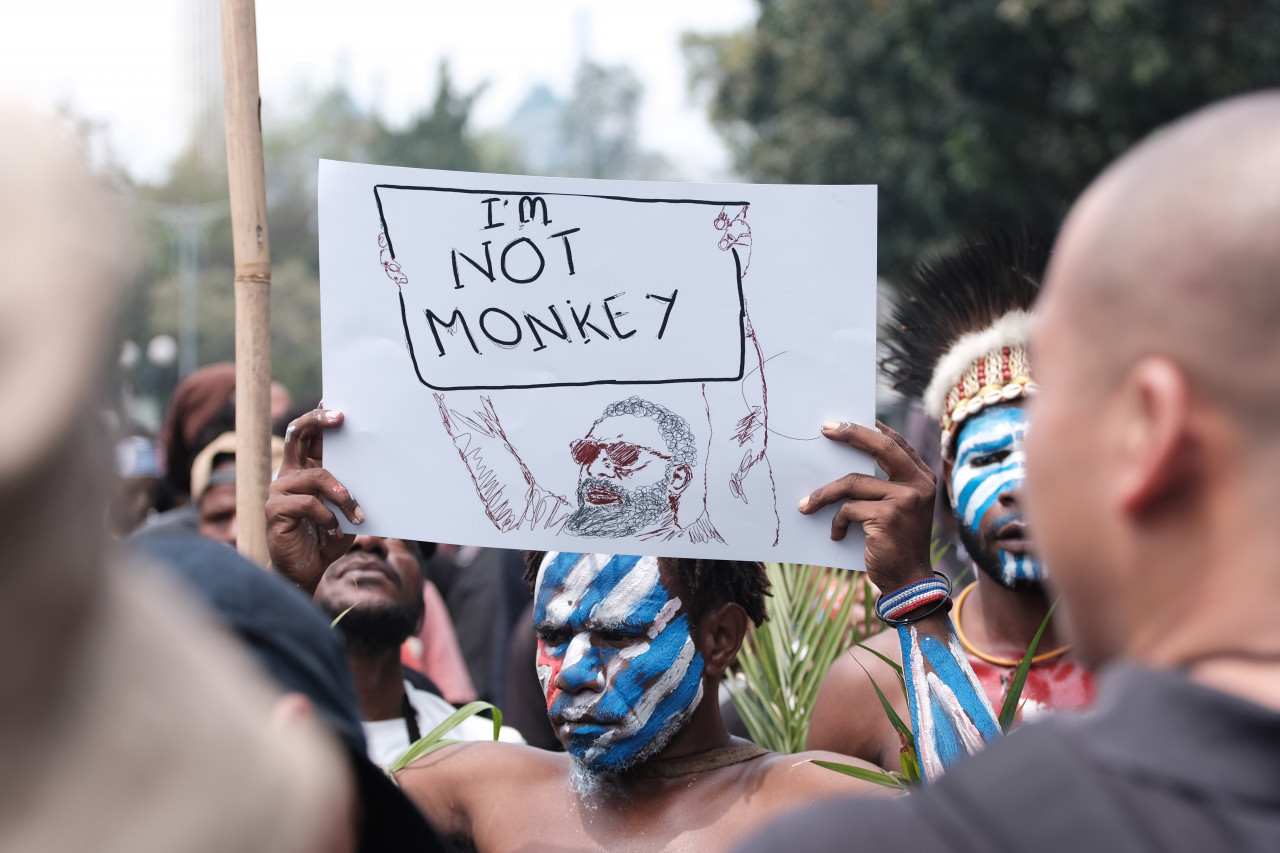Popular Reads
Top Results
Can't find what you're looking for?
View all search resultsPopular Reads
Top Results
Can't find what you're looking for?
View all search resultsPapua needs permanent solution
Only if Jokowi follows the five steps Gus Dur took in Aceh and Papua, I believe he would solve the Papua issue permanently in his last and final term.
Change text size
Gift Premium Articles
to Anyone
T
he long-standing conflict in Papua should have been settled by now. Papua needs a concrete and permanent solution. The planned revision of Law No. 21/2001 on Special Autonomy for Papua serves as an opportunity to end the conflict and establish long-lasting peace in Papua.
Trans-Papua road, bridges, houses and public health centers — on top of special autonomy funds that equals 2 percent of the government’s general allocation fund — will not offer a permanent solution. The reason is that the conflict has brewed since Papua was integrated into Indonesia on May 1, 1963, and has threatened civilization and humanity in the territory.
It is those threats that have devastated the values and culture ecosystem of Papuan society. Hence, the revision of the Special Autonomy Law should become the entry point to mend civilization and humanity in Papua. Throughout nearly 20 years of its implementation, the special autonomy, according to Papuan figure Thaha Al-Hamid, has become part of the problem rather than a solution for the Papuan people.
The continuing conflict has left Papuans in uncertainty about their future. Many have expressed their disappointment, frustration or even distrust in the government. As a result, Papuans seek an outlet, which ranges from drunkenness to a cultural movement that creates a sense of ethnic identity or, as University of Indonesia scholar Margaretha Hanita puts it, ethnonationalism.
In her research, Hanita found that ethnonationalism in Papua takes shape in cultural, messianic movements like Koreri in Biak and Hai in Mimika, which survived Dutch and Japanese colonization and is now resisting Indonesia’s sovereignty over the territory.
In the ethnonationalism framework, a state does not necessarily consist of one nation but more than one nation. American anthropologist Clifford Geertz differentiated state from nation, with the former referring to a political space where social interaction is arranged and opportunity of life and productive resource are shareable. A nation, meanwhile, is political strength in a space. History shows those different concepts when Yugoslavia broke into pieces.
Therefore, a state whose population comprises more than one nation is not a nation-state but a multination state, and the smallest culture creates a minority nation. Thereby, Indonesia is a multination state, debunking its long-held doctrine of a nation state.
Related to the politics and culture of Papua, William Kymlicka, a Canadian political philosopher best known for his work on multiculturalism, explains that the entry of various nations in a state could happen accidentally during a transfer of power, from one imperial power to another. A multination state can also be founded intentionally when various cultures agree to form a federation of common interests.
According to Hanita, the process to unite Papua with the Republic of Indonesia would define the territory’s status in the multination state of Indonesia. First is the transfer of sovereignty of the Papuans to Indonesia as a consequence of territorial, economic and political conquest, and second is the intentional integration in Indonesia for common interests. In dealing with Papua, Jakarta tends to follow the first approach and overlook social integration.
Unsurprisingly, resistance to Indonesia’s sovereignty over Papua persists, as evident in the Koreri cultural movement, which envisions the arrival of a golden era when prosperity, justice, peace and welfare prevail. As a cultural movement, it has inspired the freedom movement, which is symbolized by the Baik word sampari.
Sampari is the morning star that arises from dawn until the sunrise. Papuan figures adopted it as the national flag of a free Papuan state on Dec. 1, 1961.
Then-Indonesian president Abdurrahman “Gus Dur” Wahid initiated a solution to decades-long resistance in Papua and Aceh through a sociocultural approach instead of hard approach. First, he took local traditions, cultures and beliefs into serious consideration. While approaching ulema in Aceh, Gus Dur held intensive talks with tribal, ethnic, traditional and religious leaders, including Christian and Catholic figures, in Papua.
Second, Gus Dur treated separatist groups like the Free Aceh Movement (GAM) and Free Papua Organization (OPM) as citizens who are equal to the rest of Indonesians. He did not consider the groups enemies of the state as the New Order did.
Third, Gus Dur directly spoke with the GAM and OPM leaders, whom he understood as calling for justice, in open dialogues.
Fourth, Gus Dur also intended to establish a human rights court to solve the past atrocities committed against the Aceh and Papuan people and to avoid the crimes against humanity from recurring in the two territories in the future.
Fifth, Gus Dur involved the international community in the negotiations, which used a humanitarian approach. In the Aceh case, it was the Henry Dunant Center for Humanitarian Dialogue (HDC). The involvement of the international facilitator was unimaginable or considered a taboo during the New Order era. The role of an international facilitator has never materialized until today, although such a model proved effective in bringing peace back in Aceh in 2005.
President Joko “Jokowi” Widodo has repeatedly displayed a commitment to solving the Papua issue once and for all. He has accelerated infrastructure development in Papua and visited the easternmost region more frequently than any other Indonesian president. But this is not enough.
Only if Jokowi follows the five steps Gus Dur took in Aceh and Papua, I believe he would solve the Papua issue permanently in his last and final term.
***
The writer is former member of the assistance team who drafted the Law on Special Autonomy for Papua, and author of Masa Depan Papua (The future of Papua).










